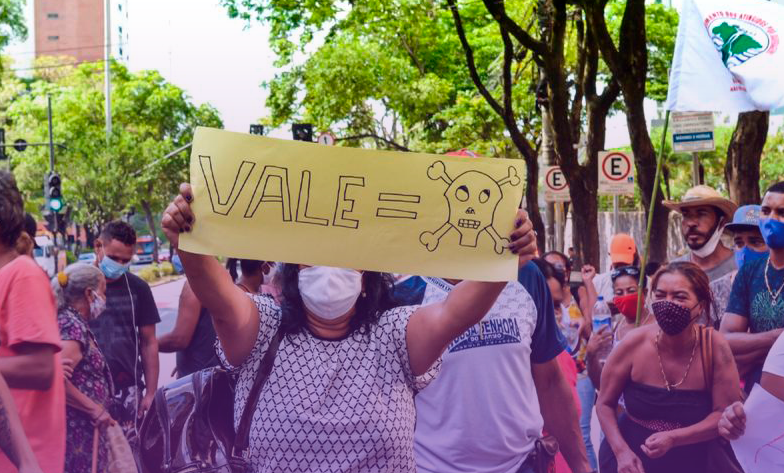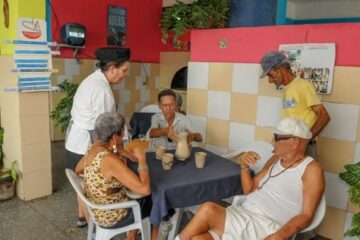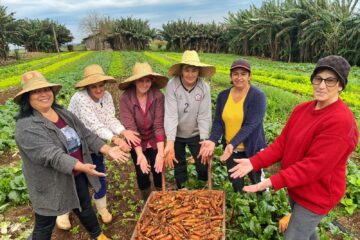History has proven and shows us every day that any struggle can emerge victorious as long as the peoples organize. This must be said, first and foremost, when we address the resistance against Vale/Samarco and Billiton or any other struggle anywhere in the world.
As an Indigenous sister tells us, everything is connected: the peoples in national territories and on the international level. You cannot win the war without the people. Without the people, we endure coups and interferences in democratic processes. We must say that democracy is more than just the right to vote. As we have said in recent election campaigns and in every process against neoliberalism, democracy is the long-standing, heroic participation of its people, as Cuba does it, saying, “yes, it is possible,” developing its process of solidarity, unity, and internationalism.
We believe in the people, and we know we are currently living a very dynamic moment. We have governments with the people, but we do not have power. We have governments with the people, but they cannot—or often would not or will not—stop attacks or promote processes to curb transnational corporations. They don’t say, “go away,” like Hugo Chávez said to Brazilian companies in Venezuela when they wanted to take the Venezuelan people’s resources, violating human rights and grabing their wealth.
Transnational corporations now have power that is parallel to that of governments. It is political, economic, ideological, cultural power. It even has its own colors—in my state, Minas Gerais, Brazil, Vale paints everything green, which is “its color”; it paints schools, churches, parks, and it has even done the restoration works for Christ the Redeemer in Rio de Janeiro. Its signs read that it is a good company, because it is everywhere, sponsoring historic sites.
While it may look like today’s international battle has a difficult correlation of forces, there is no other way out—we, the social movements of people affected by dams, are tasked with waging the struggle, wherever it may go. We must build people power with regulatory processes and denunciations against companies.
Vale is an example of what cannot happen anywhere else in the world anymore. Not only in Brazil, Vale is in Indonesia, a country with 17,000 islands often stricken by earthquakes. When Vale bought Inco, from Canada, it increased its operations in Indonesia, building dams, operating mines, and affecting people. Comrades in Indonesia are horrified, picturing how dam breaks will happen in the years to come. Vale has operations in more than 30 countries around the world.
In five years, Vale has killed 272 people in Minas Gerais, and to this day, no court has found it guilty. The victims want to know who are the ones to blame. The company and its structure are secured, but those who are affected are not safe. To this day, not one house has been provided to the people who have been affected by the first dam break, which happened more than eight years ago in the town of Mariana.
Police reports show that Vale knew that its dam was going to break. They often find it cheaper to let dams break, because they are not held accountable to ensure the rights of those who are affected. We still don’t have a national policy for the people affected by dams or mega projects in Brazil. We have no negotiation mechanism or structure with the government. We don’t have a concept of what it means to be a person affected by a dam or dam break in Brazil. It is up to the companies that build the dams to define this concept. Seventy percent of the people affected have had access to no rights at all.
Through the movement, we are expanding the understanding of what it means to be affected. The people affected by dams are no longer just those who are affected by dam breaks—they are, for example, affected when floodgates are opened with no warning when there are heavy rains; or people affected by climate change, by hikes in power prices; by alluviation. This is why heavy rains in January and February fill homes in Mariana and Brumadinho with mud and illnesses. These areas are at risk due to mining, and health is terrible in the area. There is no established policy in Brazil or internationally that represents achievements for the people who are affected.
What we do have is our own resistance. Comrades from Ecuador, for example, have been resisting for years, struggling against the exploitation perpetrated by Chevron. This is our resistance—no matter who is in office; we are with the people who are affected. Indigenous people, Quilombolas [Afro-Brazilians from ancestral communities], and women are the ones who are most affected by the lack of negotiations or reparation processes.
Companies do not negotiate. They criminalize.
Vale has tremendous power over the government. It has secured the re-election of right-wing Romeu Zema for the Minas Gerais state government, giving 12 billion reais to the state across 853 municipalities. A highway is also being built in a metropolitan area to move Vale’s mining production.
March 14th is our day to celebrate the international struggle waged by the people affected by dams. It is a date to defend rivers, waters, life. We have waged a struggle and managed to speak to a judge, who ordered Vale to pay individual rights to people affected. Days later this year 2023, Vale filed an appeal asking not to fulfill its obligations toward the individual rights of families affected in Brumadinho. It is all negotiated without the people who have been affected.
You only lose the struggle if you yield. Every day, the people who are affected are becoming more and more aware of our rights. We have had many wins, and this is why we keep going, ever stronger.
We believe in our internationalist struggle for democracy, against companies’ power running parallel to governments, for the end of impunity, fascism, and neoliberalism. We struggle for sovereignty. The process of privatization and blockade of countries is the most radical form of attack against the human essence, like they are doing to Cuba, like they did by selling the previously state-owned utility company Eletrobras in Brazil. Our struggle will continue and will be ever stronger, because we are organizing in the territories. This is what empowers our struggle, our resistance, and the wins we shall have tomorrow.

Soniamara Maranho lives in Brazil and is a member of the International Movement of People Affected by Dams (MAR) and the Continental Day for Democracy and Against Neoliberalism. This is an edited version of her speech at a meeting that brought together movements and organizations in Brasília in April 2023.




